A Western yotuber whose channel currently has 281,641 subscribers has made a video, in which he listed countries which he believes to be artificial, or created arbitrarily without historical justification.
Among the countries he listed, he included Ukraine, saying that Ukraine "was created as an artificial buffer state by Germany".
In the video, he describes many States which some believe to be artificial, it must be said in full disclaimer that I am stating that I agree or disagree with these things, however his mention of the Ukraine gives an opportunity to discuss how Ukraine came about. It will also allow us to explain Ukraine's artificial origin, and what that means, first and foremost, that it is NOT a prejudiced statement against Ukrainians, but rather a matter of historical fact.
As more people discover the truth about the origin of Ukraine as a state, rather than a cultural region, there may be questions raised as to whether or not it against the Ukrainian citizens to say that Ukraine is an artificial state. It must be explained what this means.
What is an artificial state?
In this context, when we say "artificial state" this is intended with absolutely no animosity towards the residents of an artificial state. This is not denying the existence of the Ukrainian language or ethnos, or discounting their value.
All the term means, in this context, is a state arbitrarily created, which is not based on long periods of sovereign, independent development. In other words, if you looked 300 years ago, there would not be a state called Ukraine, any more than the USA.
What is in the name "Ukraine", and Ukraine as an artificial state
What does it mean when we call Ukraine an artificial state? It simply means that Ukraine in its current form, as a nation state, was not created due to centuries of homogenous cultural development.
The history of modern Ukraine's territory formation dates back centuries, but not the term, idea, or cultural project of "Ukraine", as the land and people went by different names in history, ultimately derived from the ancient state of Rus'.
The lands of Rus', in what is now Ukraine, were occupied by Poland-Lithuania for around three centuries, between the mid-14th century, to the mid-17th. In 1654, most of so called Ukraine save for its western part was reunited with Russia.
How was the name Ukraine used in history?
It is important to understand how this name Ukraine came to be. It must be said that this word has the traditional meaning of "Borderland", similar to the Germanic term "Mark", for example, in the name Denmark (mark of the Danes).
Hypatian Codex
It carries the meaning of a territory on the edge, the border, or the outback of a country or region.
The oldest mention of the word "Ukraine" is found in the Hypatian Codex, also called the Ipatiev Chronicle, dating to 1187 the Year of Our Lord.
The 0 uses the term Ukraine, to refer to the steppe on the borderland of the Principality of Pereyaslavl, one of the territories of Rus'.
Pereyaslavshchina (the lands of Pereyaslavl) bordered with Kiev in the West, and with Chernigov to the north. To the south and east, it bordered the vast steppe, from which Rus' people would constantly come under the attacks of Asiatic nomads and barbarians, the Cumans (Polovtsi), the Pechenegs, and ultimately, the Mongols.
As a result of its position, being the most exposed of the principalities, Pereyaslavl became the foremost frontier of Ancient Russia. These frontiers, in any state, be they Slavic Krais (as in Ukraine), or Germanic Marches became crucial in the defense of states. In the west, special titles were given to the nobles who ruled these lands, principle, this is how the title Margrave or Marques evolved, a special status given to the ruler of a border region.
Border regions were obviously the first to be invaded, and so their defense, and who defends them, are very important. For example, Svyatoslav of Kiev, father of Saint Vladimir, was assassinated by a Pecheneg Khan in the steppes by Pereyaslavl, beyond the Dnirpo rapids, near where the Kozak Sich would later be constructed in the so called 'Wild Fields".
The south-eastern border of Rus' was mobile, moving forward and backward depending on the tide of heathen invasions. With the death of Prince Vladimir the Son of Gleb, of Pereyaslavl, it was said:
о нем же украина много по стона (ukraine groaned for him) (On the death of the Prince of Pereyaslavl Vladimir Glebovich. Ipatiev Chronicle, edition of the Archaeographic Commission, St. Petersburg, 1908, p. 653.).The Russian Chronicles
In the Russian Chronicles of the Galician and Volyn lands (which border Poland), it is said:
Данило тоді вернувся додому, і поїхав з братом [Васильком] і забрав Берестій, і Угровськ, і Верещин, і Столп'є, і Комов, і всю Україну [Ukrainian language source]Pskov Chronicle
Translation: "Danilo ... with his brother took Berestiy, and Ugrovsk, Vereshchin, and Stolpie, and Komov, and all ukraine" (This is also found in the: Літопис руський, Київ, 1989, с.375)
The Pskov I Chronicle referring to the events of 1348 in the Novgorod and Pskov also used the word Ukraine in the meaning of "boarder land:
Kozak Charter
The word Ukraine retains the casual meaning of "borderland" hundreds of years later, in the charter of Tsar Fyodor Ioannovich (1593) to the Don Cossacks, and Zaporozhian hetman Hrishtop Kositsky. The later talks about defending the Slavic lands from the tatars, talking about the need to defend the Donets and our ukraines (plural).
In Russian literature until the end of the nineteenth century, the word "krajina" was still used in the sense of "the limit that the land is on the edge".
How does "ukraine" (украина) became a proper name?
The key is to remember that modern Ukraine is a combination of several historical territories, primarily three, Galicia in the West, Malorossia in the center, and Novorossia in the south-east.
While all Ukrainians lands were once indistinguishable part of Rus', they became divided after the Mongol invasions. Malorossia was reunited with Russia in 1654 under Hetman Bogdan Z. Khmelnitsky, and Novorossia had yet to be built, but Galicia, Western Ukraine, remained controlled by Poland-Lithuania.
Eventually, Galicia fell under the influence and control of Austro-Hungary, being absorbed into their Empire.
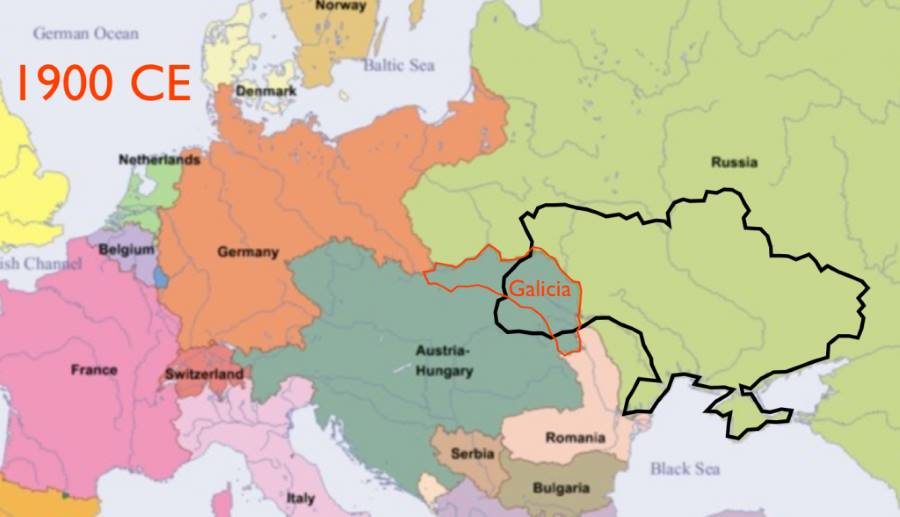
Gradually, the word passed to Russia, where Carpathian and Little Russians fled from Polish atrocities, and "Slobodskaya Ukraina" (Free Ukraine) appeared near modern-day Kharkov. In 1650, the engineer "Guillaume de Boplan", in the description of "Description of Ukraine" writes in a dedication to the Polish Jan-Kazimir:
"I dare ... offer your August Majesty the description of this large borderland - Ukraine (Ukranie), located between Moscovie and Transylvania". ("Description d'Ukranie, qui sont plusieurs provinces du Royaume de Pologne., Containes de deux deux de confines de la Moscovie, insques aux limites de la Transilvanie", Rouen, 1660)Samuel Grondsky, Polish author of the history of Khmelnytsky (circa 1660) mentions Ukraine, as a region located at the edge of the kingdom.
By the middle of the XVII century. Ukraine is a well-established Polish term for the entire Russian territories controlled by Poland.
This is demonstrated by the comparison of the official universal of King Jan-Casimir (December 1657) on measures for quartering troops, which refers to the "Voivodeships of Russian, Volyn, Podolsky, Belzsky and Podlaski" , with his paraphrase in a private Polish letter where all these voivodships are called one word - "Ukraine".
As a result of wars with Poland and the Ottoman Empire in the XVIII century the Russian Empire acquired the Right-Bank Ukraine, Volhynia and Podillya, then the Crimea, the Azov Sea and the Northern Black Sea Coast.
At that time, the Kiev, Volyn, Podolsk, Kharkiv, Ekaterinoslav, Tauride, Novorossiysk and Kherson governates were established.
At the same time, the accessed regions did not have national autonomy as such. The term "Little Russia" (Malorossia) was used, and the inhabitants were called Little Russians or South Russians.
It is worth noting that if the term Ukrainian began to appear organically on Russian lands, once may argue it was a national spring, but the fact that the popularization and spread of the term Ukrainian appears exclusively on the territories of Empires hostile to Russia says a lot.
This exposes that foreign Empires actually developed the term Ukrainian as a way to dominate both Russia and the Ukrainians themselves, by attacking their unity.
On the eve of the First World War, Western Ukraine, together with Transcarpathia, were part of the Austro-Hungarian Empire an empire which was often viewed as a Roman Catholic, occupying spiritual enemy to Orthodox Slavs, and the first world war did begin because of Austrian aggression against Serbia.
Ukraine as a national idea was created when the Austro-Hungarian Empire pursued a policy of Ukrainization on the local Ruthenian population of what is now Western Ukraine.
This policy spread throughout the lands in the 19th and early 20th centuries, and after the fall of the Russian Empire, it went through a series of developments.
The Austro-Hungarian "Ukrainian project" outlived their Empire, as well as the Russian Empire, this policy aimed at division between Russians, Malorossians, and Rusyns was continued by Bolsheviks.
Following the coup (or as they call it, revolution) in February 1917, and until 1920 on the territory of Ukraine, there were 16 self-proclaimed political entities. Let us remember that before then, for hundreds of years, the majority of Ukraine was a seamless part of Russia with no national uprisings (beyond internal Cossack disputes).
The first such republic was the Odessa Soviet Republic, established on January 17 (30), 1918, its territory covered Kherson province. The republic existed until March 13, 1918, when Odessa was captured by German and Austro-Hungarian troops.
Another territorial Soviet republic in the east of Ukraine was formed in Simferopol on March 7-10, 1918.
Officially it was called the Soviet Socialist Republic of Tauris in the RSFSR and up to 19 March included the entire territory of the Taurian province - the Crimean peninsula and the northern regions adjacent to the Black and Azov Seas.
In late January 1918, the Donetsk-Krivoy Rog Soviet Republic was also organized on the principles of national autonomy. Her power extended to the Kharkiv, Ekaterinoslav, partially Kherson gubernias and to some areas of the Don Cossack Host.
After the overthrow of the Provisional Government in November 1917, by Bolsheviks, the Central Rada - the government of the self-proclaimed Ukrainian Peoples Republic, sitting in Kiev, issued the 3rd Universal, in which it declared the Donbass and Kharkov part of this republic.
A few days before the proclamation of the Donetsk republic, the Central Rada signed in Brest an agreement with Germany and Austria-Hungary, which allowed the entry of Austro-German troops into the territory of Ukraine.
I would like to point out this is the second time a treasonous union was signed in Brest, a city that always finds itself in battle for Russian civilization it seems. In the late 1500s, the union of Brest was signed, allowing Roman Catholics to occupy and steal Orthodox land.
By early May 1918, the entire territory of Ukraine was occupied by the troops of the Central Powers. The Ukrainian Central Rada was in a political crisis, and its activities did not meet the expectations of the interventionists.
Then Germany and Austria-Hungary decided to change the government and elected hetman of Ukraine P. Skoropadsky - former lieutenant-general of the tsarist army. The country received a new name - the Ukrainian State.
Within a year, however, by May 1919 almost the entire territory of Ukraine (except Western) was controlled by the Red Army and Bolsheviks abolished all the republics formed in the territory of modern Ukraine.
On 3 December 1919 the Communist Party conference adopted a special resolution on the Soviet power in Ukraine by which it recognized the independence of the Ukrainian Soviet Socialist Republic. Malorossia was thus officially turned into Ukraine.
On 30 December 1922, delegations from the congresses of the Russian, Ukrainian, Belorussian, and Transcaucasian Soviet Socialist Republics approved a treaty for the formation of the Union of Soviet Socialist Republics.
The entire territory of the Donbass and Novorossiysk gubernias were transferred to the newly-formed Ukraine.
Central and south-eastern Ukraine thus joined the Soviet Union, whereas the Western part would fall under Polish control in the interbellum period.
In the spring of 1920, VUTSIK and the Central Committee of the Communist Party (Bolsheviks) established a special commission for Ukrainization, where the "first violins" were played by former supporters of Symon Petliura who joined the ranks of the Bolsheviks: G. Grinko, V. Blakitny.
In 1922, the decree of the Bolsheviks Skrypnik and Gunko, the word Little Russia was replaced by the word Ukraine, and the Russian language - Ukrainian.
As the contemporary writer S. Sidorenko writes: "The word" Ukrainian "was little known in Russia. When the Bolsheviks began to impose it on the population, the Little Russians asked each other where and what we stole? " (note: in Russian Ukrainian (украинец) phonetically is similar to the word "steal" (украсть).
A good example of how actual people from Ukraine felt, is to simply look at those living in central Ukraine, in Malorossia, before and after the revolution. Three good examples are the miracle-worker Saint John of Shanghai and San-Francisco, Saint Lavrenty of Chernigov, and the 6-time world champion strongman Ivan Podubny.
All three were born in Ukraine, around the same time turbulent period. Saint John in Donetsk Oblast, Slavyansk raion, Saint Lavrenty in Chernigov, and Ivan Podubny, who traveled to America all were known and identified as Russians.
Saint John's attachment to the Russian world and its future, the Russian Church Abroad, and his miracles are legendary. Saint Lavrenty prophesied concerning the events of the Ukraine crisis, and he felt very strongly that Ukrainians and Russians were one people, feeling that when people called him Ukrainian, they were saying he was from an outback.
St. Lawrence spoke emphatically and strictly, with warning, that the word for our native land and people is Rus' and Russian.8 "And it's absolutely necessary to know, remember, and not forget that it was the Baptism of Rus' (Russia), and not the baptism of Ukraine. Kiev is a second Jerusalem and the mother of Russian cities. Kievan Rus' was together with Great Russia. Kiev without Great Russia and separate from Russia is completely unthinkable.This is because these legends were born in the period of Holy Rus', when Russia was an ideal, a state of mind, and a shining beacon for the world. This article explains best why Russians must insist on the term Holy Russia.
It was believed Russia was a Holy union of Orthodox people working towards a divine future, not a humanist union of materialistic people seeking only to improve the human condition. This was the difference between the Communist and the Orthodox view of Russia.
Bolsheviks even believed Russia was chauvinistic towards other peoples, which is falsehood.
The XII Congress of the Communist Party, in April 1923, declared the party's course on the national question to be "localization", and the Conference of the Communist Party, held in the capital, Kharkov, declared the policy of "Ukrainization" as an integral part of the general national policy.
On July 27, 1923, the decree of the Council of People's Commissars of the Ukrainian SSR "On Measures for Ukrainianization of Educational, Cultural and Educational Institutions" was issued.
Measures have been developed for the transition to the Ukrainian language of most educational institutions.
Those entering the civil service had to study the Ukrainian language for 6 months, and those who are already in the civil service for 1 year. In practice these measures were not carried out rigidly or completely, however.
The policy of forced Ukrainization of the regions that had never been Ukrainian was continued by Bolsheviks in 1925-1928, when the Ukrainian Republic was headed by General Secretary of the Central Committee of the Communist Party Lazar Kaganovich.
The archive documents reveal, in particular how students and workers of former Novorossia and Malorossia protested against forcing them to use Ukrainian language alien to them.
This policy was curtailed by Stalin in 1932, when it was understood that it resulted in the growth of nationalism in the Communist Party elite.
Bolsheviks nevertheless managed to do for Ukrainization within a decade, what Poles and Austrian-Hungarians attempted to do for centuries in Galicia and Volynya. They even managed to extend the Ukrainian idea to regions where it traditionally did not exist, as far as Kharkiv!
During the Great Patriotic War, some Ukrainian nationalists under the leadership of Stepan Bandera allied with Nazi Germany.
His organization of Ukrainian Nationalist provided manpower for the Waffen SS, and their little known Galicia division.
Their goal was to create a single party fascist state, with Bandera at the top, spearheaded by his organization of Ukrainian nationalists, which allowed murder and assassination of Poles, Russians, Jews, and Ukrainians who didn't agree with their project.
Eventually, the Nazis were driven away by the Soviet Army, and all of what is now Ukraine would be reintegrated into the Soviet Union.
This reintegration included the forceful repatriation of Carpatho-Russian/Rusyn people, by the Soviet Authorities, who had otherwise lived in Slovakia, Poland, etc. These Rus' people were forced to return to Ukraine, and in fact, to the most highly Ukrainianized regions thereof, in Galicia.
Living in these areas, where Bandera's nationalists had their stronghold was very difficult for this most illusive member of the Rus' family, who were often forced to forget their unique background. In modern Ukraine, they are considered only a sub-category of Ukrainians, referenced in pop songs as "Our Highlanders/Nashi Verkhovintsi)", yet this same song references the many tribes, Boiki, Lemko people, Mazuri people, etc.
This is the nature of Ukraine, it is a land profoundly divided into many different cultural regions.
These regions can almost be seen as three different countries. As discussed in many articles I have written, these regions are from West to East
- Galicia-Volhynia - the far west, the only region ruled by both Poland AND Austro-Hungary. This region includes Transcarpathia. This is the most Ukrainianized region.
- Little Russia - Malorossia, Central Historical region of Rus'. This region is split in the middle.
- New Russia - Novorossia was southern and eastern Ukraine. This is the most "Russian" region.
New Russia, however, was not part of Old Rus', hence the obvious name "New Russia", as it was settled by the Russian Empire on land occupied by Tatars and Turks in the 18th century, and it was not part of Rus', nor the Polish-Lithuanian Commonwealth, nor the Austro-Hungarian Empire.
Both Little Russia and Galicia were part of the Polish-Lithuanian Commonwealth, however Galicia was part of Austro-Hungary, unlike Little and New Russia.
Little Russia was reunited with Russia before New Russia was founded, however it had been in the Commonwealth longer.
The main point is all of these regions were part of different states, however none of them went by the name Ukraine. This is entirely a modern invention.
Therefore, when we say Ukraine is an artificial state, we are simply saying it was not created on the basis of a separate nation, with a separate ethnogenesis, myth of origin, and centuries of cultural development, but rather, it was created by the merging together of several different cultural regions which were essentially forcefully joined together, and eventually formed somewhat of a union.
That is not in any way, an attack against the Ukrainian people. Rather, it is acknowledging that the creation of Ukraine, was actually intended to make the people living in the Ukraine easier to conquer by foreign powers, than if they were homogenously integrated into a natural Rusian (if not Russian) state).
What does it NOT mean, when we say Ukraine is artificial
Now that we have explained what it means that Ukraine is artificial, it is worth looking into what it does NOT mean. It does not mean that the Ukrainian people do not exist. It should NEVER be used to attack Ukrainian people.
Clearly, there are people who identify as Ukrainians, and this is their right, just as Crimeans exercised their right to join the Russian Federation.
Saying Ukraine is artificial does not deny Ukrainian people the right to heritage and culture. For example, Ukrainian people can still claim cultural heritage from Kievan Rus, which they do indeed have.
The issue, is when they try to appropriate Kievan Rus' and say those people were "Ancient Ukrainains", and attempt to deprive Russians of the right to the name Rus'
This is exactly what some Ukrainian nationalists do, who claim that Russia should be renamed to Moscovia.
As historian Andrey Vlasov, says in this video:
"Kievan Russia, ancient Russia, Medieval Russia...we can no longer define whether it's Ukraine or Moscow Russia, it all happened before that."Saying that Ukraine is an artificial state does not deprive them of their history. It is not saying "You do not exist, you are some stateless, orphaned people, you are not from Rus", rather, it is saying to them:
"Of course you are from Rus', just like Russians, Rus' is your ancestor. If you wish to identify as Ukrainian now, that is fine, but you can't claim Rus was only Ukraine. Rus' was Rus', and you are a part of that, but if now, you want to call yourself Ukrainians, that is your business. You can not go back in time, and change the names of ancient people to suit your current politics, and you can not claim them only for yourself."
Finally, admitting that Ukraine is artificial, and did not exist in history as a state, does not mean that Ukraine cannot exist today, as an artificial state.
This statement is not a threat against Ukraine, and it shows their insecurity if they take it that way.
Regardless of the historical issues with a Ukrainian state, it must be said, that acknowledging the fact that Ukraine is artificial, does not necessarily mandate advocating for the dissolution of Ukraine.
Artificial states can and do exist. For example, many former Soviet states especially the central Asian nations of Uzbekistan, Tajikistan, Turkmenistan, etc. are artificial, in that they were only formed during the nationalist wave that overtook the near abroad in the post-soviet period.
To be clear, there are indeed ancient cities in Uzbekistan, however they were part of tribal ruled territories or emirates, not a unified nation-state with a sense of national consciousness.
Most of these people would not even be literate were it not for the Russian Empire, and before Russia uplifted them, they dwelled in the steppes under the power of the sword, hardly any different than nomads.
Now they are states, and Russia and the international community recognizes this, however we can not pretend they have a history of continuous statehood. It was only under Russia that they came to understand what a state - in the Western concept - even was.
There are plenty of other artificial states - states formed without regard to continuous historical borders and trends.
Perhaps the biggest example and the one most supported by the west is Israel. Modern Israel is a totally artificial state - indeed, it existed in Biblical times, but the modern version has nothing to do with it aside from the land it is located on.
Much has changed since then, and the land was ruled after Christ by the Romans, under whom the majority of it's inhabitants became Orthodox Christians. Later the land was conquered by the Arabs (various rulers and caliphs), and the Ottoman Turks, with whom it remained until the First World War.
Only in the mess that was the end of WW1, did the Ottoman Empire collapse, and the French and English decided to meddle in the Middle East.
Then came the infamous Sykes-Picot agreement, when they drew lines in the sand, and expected them to become countries. While the peoples of these lands were ancient, their current states were mostly contrived.
Israel was formed by a slow process of genocide against the native Syrians, and Arabs/Palestinians which continues silently to this day, essentially the same brutality the Nazis visited on the Jews (and also Slavs, etc.), the Zionists visit on them.
Still, the Israeli occupation of Palestinian and Syrian land is totally tolerated by the West, and Israel is recognized internationally as a state.
It is worth noting that Palestine is also an artificial state - once again, these people were by ancient origin, Syrian Christians originally, and citizens of the Roman province of Syria-Palestinian, so it must be stressed being an artificial state is not an insult, but a statement of fact.
The Palestinians, however, are treated with contempt by many Western powers, even though Israel is even more artificial than their state is. At least Palestianians actually lived on their land for centuries, whereas the Zionists simply appeared with western tanks and funding.
The basic argument for both of these people is "this is the land of my ancestors", yet one group is favored far more than the other.
On the subject of Ukraine, the same thing happens. All of artificial Ukraine is supported by the West, and of course, Russia also acknowledges Ukraine's sovereignty.
The West, however, do not recognize the same right for the self-proclaimed Donetsk Peoples Republic and Lugansk Peoples Republic, which only proclaimed independent statehood as the result of the fascist Maidan coup, not nationalist desires.
It was not a separatist aggression, but a reaction to a fascist take over that threatens their lives.
It is true, however, that like Ukraine, there was no Donbass Nation in history, only Rus Nation, of which Donbass (Novorossian), and Ukrainians (Malorossians) people are a part of.
Because a campaign of extremist extermination is being waged against them, and has killed over 10,000 people by official numbers alone, they have felt the need to separate from the artificial Ukrainian state, and exist on their own, for now, as a new state.
No one but the Nazis believe Donbass people don't have the right to exist, but supporting their right to exist does not involve making up stories about their origin.
Donbass people do not feel the need to pretend there was an Ancient Donbass Principality, which ruled Rus.
Donbass people do not claim Gospod' Jesus Christ was from Donbass, as Ukrainian nationalists do.
This is the primary issue with the Ukrainian theory of statehood. The issue is not alone that Ukraine is artificial; rather, out of a combination of either insecurity or extremism, Ultra-Nationalists feel the need to rewrite history in order to defend their self-determination.
They feel their self-determination gives them the right to destroy and suppress that of Crimean people or Donbass people. They (neo-Nazis) feel they can deprive Russian people of their own name, when a famous Saint from Ukraine says Ukrainians are actually part of Russia.
The issue is everyone is entitled to their own opinion, but no one is entitled to their own facts. Ukrainians Nationalists are willing to rewrite history by changing the facts on the ground with blood. They still astonishingly fail to realize they are waging war on their own soil, against their own citizens.
When will they realize this was the purpose of the project of artificial Ukrainization started by the Austro-Hungarian Empire, continued by Bolsheviks and intensified by the ultra-nationalists of the Ukraine after its exit from the USSR - to make East Slavs easier to conquer, by first letting them fight and divide each other.
Now the Nationalists run wild, having outlived their spiritual founders, and somehow, an artificial Ukraine outlived the Empire which spawned it. Regular Ukrainians are now paying the price for the extremism the Austrians started, and the Neo-cons continue.
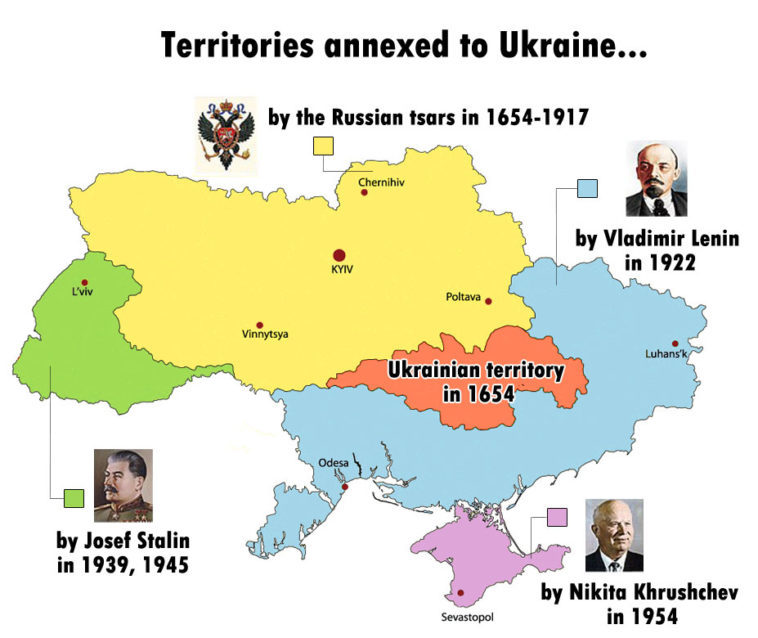
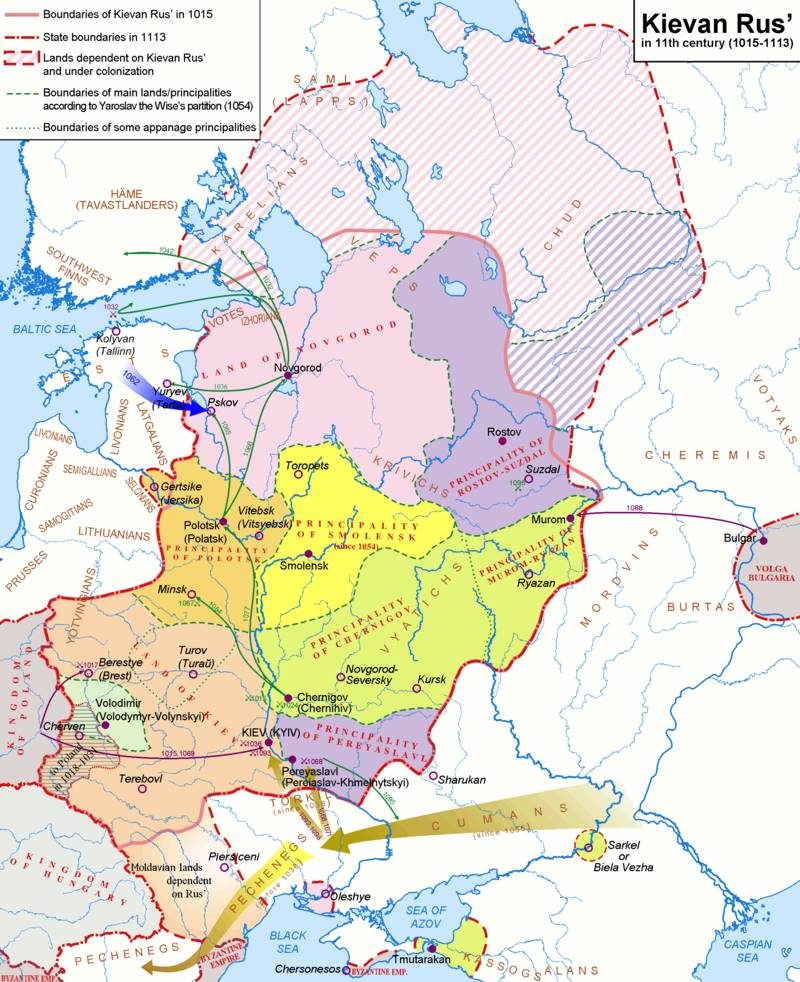
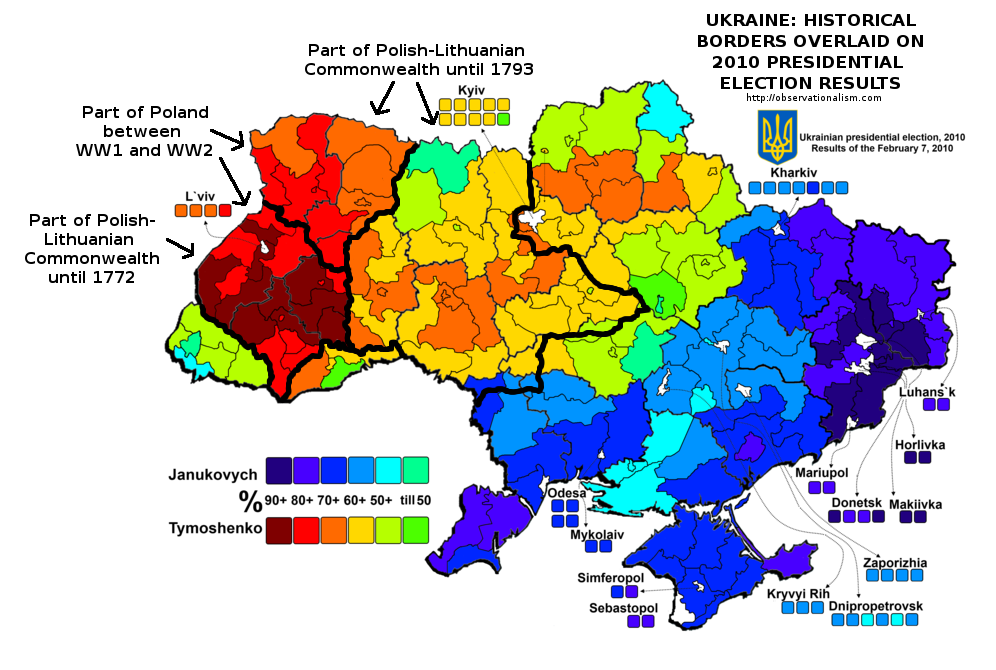
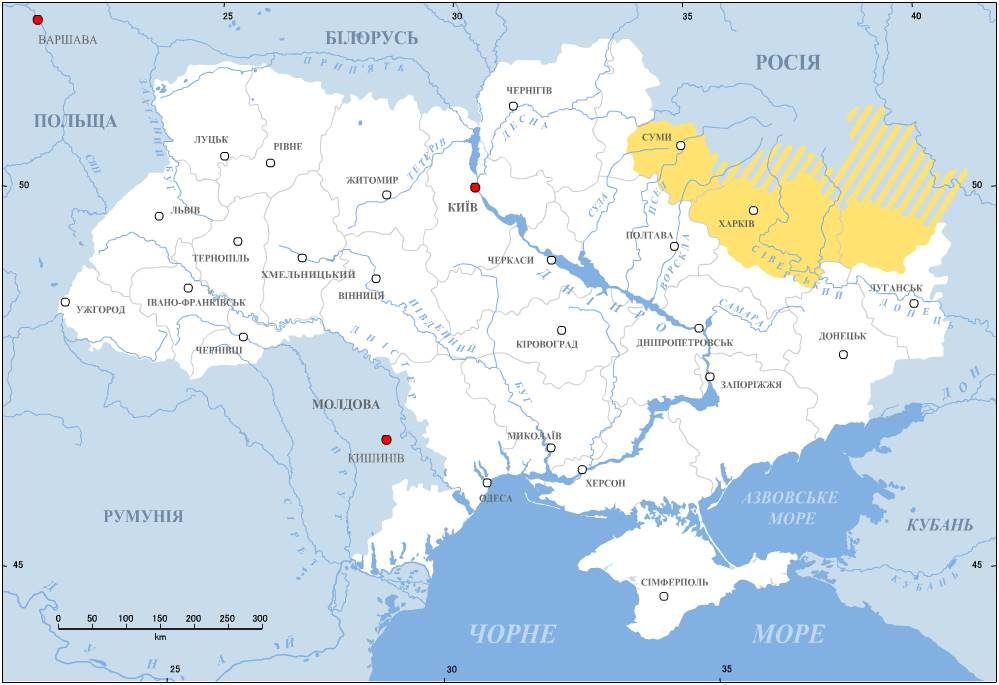
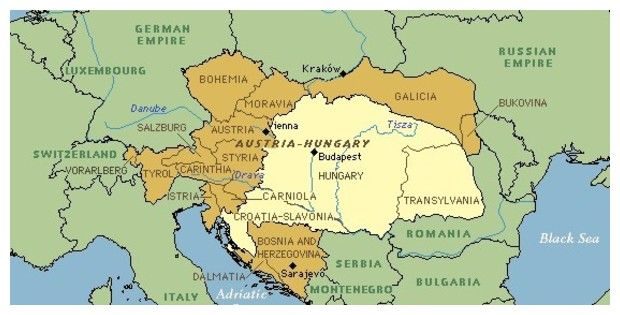
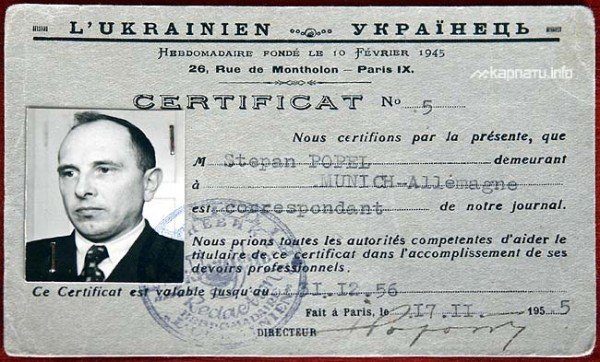

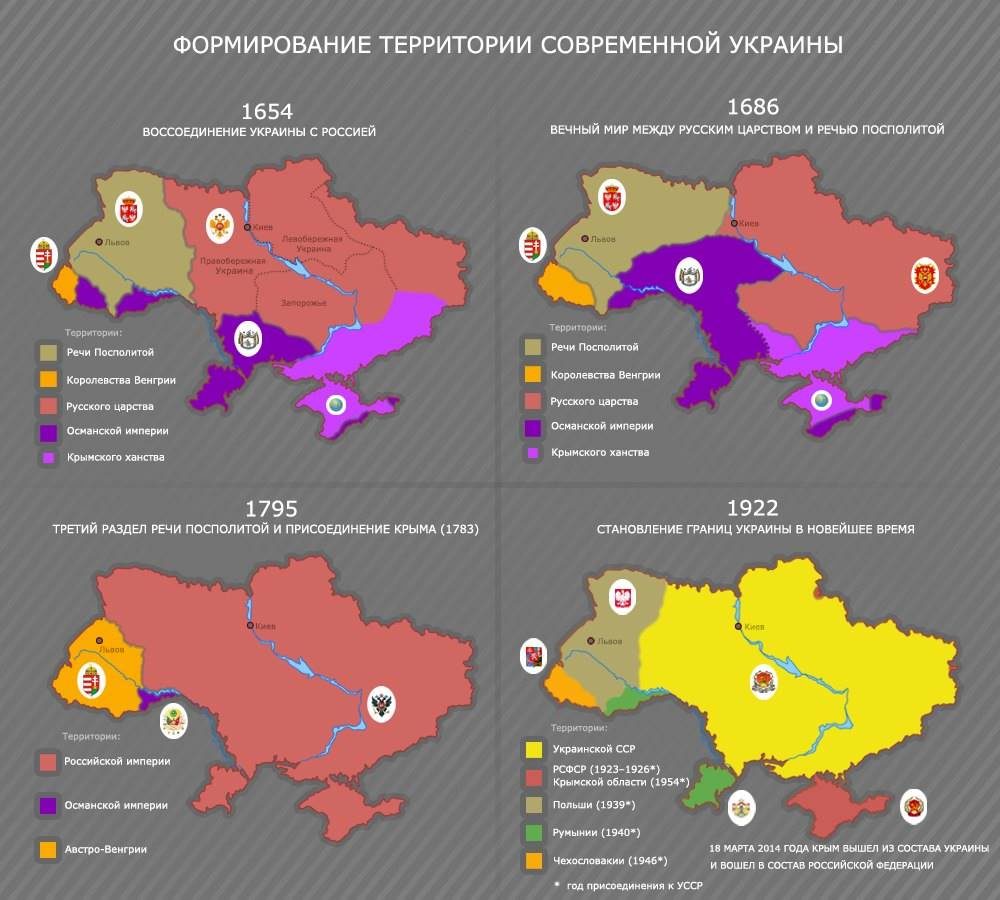



Reader Comments